The United Kingdom is somewhat unique in the world for requiring those households which view broadcast television to purchase a licence for the privilege. Initially coming into being with the Wireless Telegraphy Act in 1923, the licence was required for anyone receiving broadcast radio, before being expanded to cover television in 1946. The funds generated from this endeavour are used as the primary funding for the British Broadcasting Corporation.
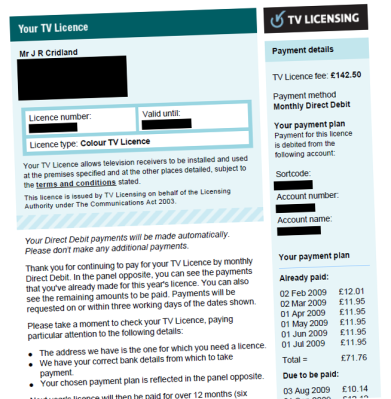
Of course, it’s all well and good to require a licence, but without some manner of enforcement, the measure doesn’t have any teeth. Among other measures, the BBC have gone as far as employing special vans to hunt down illegally operating televisions and protect its precious income.
The Van Is Coming For You
To ensure a regular income, the BBC runs enforcement operations under the TV Licencing trade name, the entity which is responsible for administering the system. Records are kept of licences and their expiry dates, and investigations are made into households suspected of owning a television who have not paid the requisite fees. To encourage compliance, TV Licencing regularly sends sternly worded letters to those who have let their licence lapse or have not purchased one. In the event this fails, they may arrange a visit from enforcement officers. These officers aren’t empowered to forcibly enter homes, so in the event a homeowner declines to cooperate with an investigation, TV Licencing will apply for a search warrant. This may be on the basis of evidence such as a satellite dish or antenna spotted on the roof of a dwelling, or a remote spied on a couch cushion through a window.
Alternatively, a search warrant may be granted on the basis of evidence gleaned from a TV detector van. Outfitted with equipment to detect a TV set in use, the vans roam the streets of the United Kingdom, often dispatched to addresses with lapsed or absent TV licences. If the van detects that a set may be operating and receiving broadcast signals, TV Licencing can apply to the court for the requisite warrant to take the investigation further. The vans are almost solely used to support warrant applications; the detection van evidence is rarely if ever used in court to prosecute a licence evader. With a warrant in hand, officers will use direct evidence such as a television found plugged into an aerial to bring an evader to justice through the courts.
Detecting Television Usage
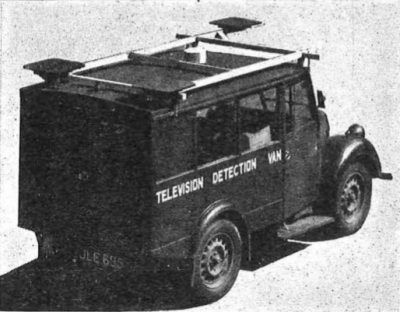
The vans were first deployed in 1952, with equipment designed to pick up the magnetic field from the horizontal deflection scanning of the picture tube, at 10.125 KHz. Loop antennas were used to detect the second harmonic of this signal at 20.25 KHz, which was mixed with a local beat frequency oscillator at 19.25 KHz to create a 1 KHz tone to indicate to the operator when a signal was picked up. Three antennas were used, one on the front of the van and two on the rear on the left and right sides. When the van was next to an operating television in a house, the signal between the front and side antenna would be roughly the same. Signal from the right and left antennas could then be compared to determine which side of the street the television was on.
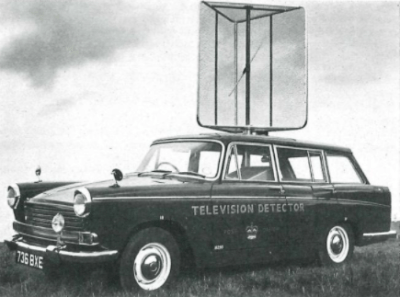
Once ITV started broadcasting in 1963, this method of detection became impractical. The two television stations did not synchronise their line-scan signals, so neighbouring houses watching different channels would create confusing interference for the detector. To get around this, the vans switched to detecting the local oscillator of the TV set’s superheterodyne VHF receiver instead. With stations broadcasting on bands spanning 47 to 240 MHz, it was impractical at the time to build a tuner and antenna to cover this entire range. Instead, the equipment was designed to work from 110-250MHz tuning in the fundamental frequencies of the higher bands, or the harmonics of the lower frequency oscillators. A highly directional antenna was used to hone in on a set, and a periscope was installed to allow the operator to view the house the antenna was pointing at. If operating in the dark, the periscope could instead be used to shine a small dot of light in the direction of the antenna’s facing, to identify the relevant target. Results were cross-referenced with a list of houses with lapsed or absent licences to help hunt down evaders.
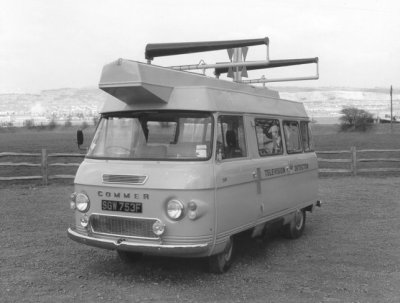
The introduction of UHF transmissions led to further redesigns. Engineers again leaned on harmonics to allow a single system to cover the full range from low VHF to higher UHF frequencies. A pair of 6′ long log-periodic spiral antennas were used, mounted on top of the van, which could be varied in spacing to effectively tune different frequencies. In practice, the antennas would be pointed towards a row of houses, while the van was slowly driven along the street. The beam pattern of the antenna pair would show seven distinct lobes on a CRT inside the van when a TV was detected. An operator would press a button to mark house boundaries on the CRT as the van moved, and when the lobe pattern centered on a particular house, the TVs location was clear. The hardware was further refined over the years, with various antenna rigs and detection equipment used as technology marched on.
Seeking Television in Modern Times

Modern efforts to detect licence evasion are shrouded in mystery. Modern flatscreen displays receiving digital television signals do not emit as much radio frequency interference as older designs, and any such signals detected are less easily correlated with broadcast television. An LCD television in the home can just as easily be displaying output from a video game console or an online streaming service, with both being usage cases that do not require the owner to pay a licence fee. Based on an alleged BBC submission for a search warrant in recent years, there may be optical methods used in which reflected light from a television in a viewer’s home is compared to a live broadcast signal. The BBC declined to answer the Freedom of Information request with any details of their methods, other than to say they have employed vehicles and handheld devices in enforcement efforts. However, given the multitude of broadcast, cable and satellite channels now available, the comparison effort would necessarily be much harder, leading some to suspect the days of the detector van are largely over.
While the TV licence may have its days numbered with the increased dominance of streaming content, it remains a quirky piece of legislation that spawned the development of a technical curiosity. If you fancy yourself a television sleuth, sound off in the comments with your chosen approach to hunting for televisions watching broadcast content illegally in this modern era. And be sure to look over your shoulder – you never know when TV Licencing might be knocking on your door!

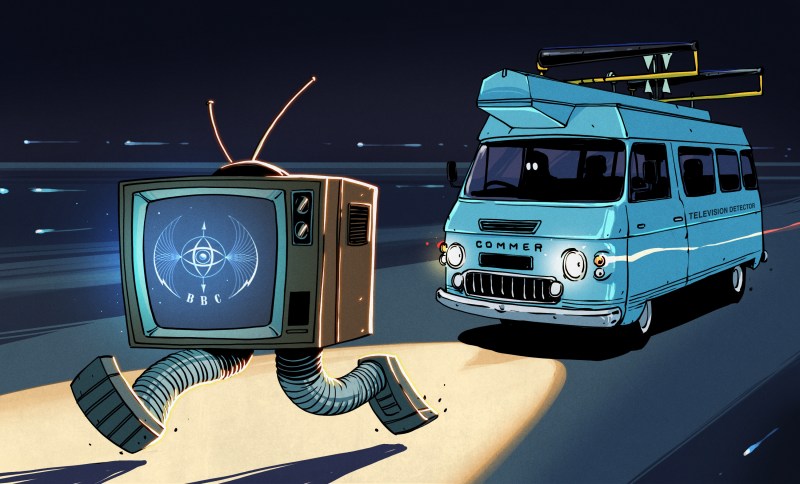














My God, the amount of perfectly good money blown trying to chase down a few pounds a month in licensing fees. Just bump taxes up a smidge, scrap the license, and stop wasting money and time, and the courts time trying to hunt down license fee dodgers.
You don’t take somoene publicly to court to get money from them, you do it to get money from all the other people you intimidate by doing it.
We just have pbs hold your favorite programme hostage, it’s simple give them the money and they’ll stop interrupting
This would never work in America. Those vans would become immediate bullet magnets.
Who watches PBS?
They used to have a TV license in Australia at one point and I wouldn’t say no to bringing it back if it worked like the UK where all the money goes straight to the BBC and allowed the ABC to be independent of government interference and the particular politicians in power. (although I believe when the BBC exposed the fake so-called “evidence” to justify the war in Iraq, the government changed the laws to give the government more control over the BBC)
but it doesn’t end up working like that..the bbc no there number is up (no one wants the tv liscenece in the uk anymore we use sky and such) so they do exactly what the government tell them and they are the propaganda machine for the uk.. in turn the gov keeps people funding them with tax
-10
Anyone remember the ‘cat detector trucks’? They got Eric.
“TV Detector Vans Once Prowled The Streets Of England”
They prowled Scotland and Wales as well.
United Kingdom Great Britain England
I stopped paying the BBC “tax” at the Scottish independence referendum, they are supposed to be impartial and unbiased but really they are just the propaganda wing of of the Tory party.
I get a monthly threatening letter which now goes into the bin unopened.
From the perspective of a viewer and from the perspective of the author of a livestream, youtube live is free. The fact that Youtube generates revenue with ads doesn’t change the fact that someone can broadcast a stream without having to pay and that someone can view a stream without having to pay.
But suddenly there is a third party that claims that no, they do have to pay, even though they had nothing to do with either the service Youtube provided or the content the author created.
But like I said if the fact some revenue is generated by someone (Youtube) for a service they offered is a blocker for you, let’s use a different example: a live stream made available through P2SP. No ads, no charges, not even companies involved. This would still fell under the TV License claim.
I’d rather feed crt scan signals emitted by TV to the power grid (thru the filters). Whole power grid becomes a distributed TV :) Let them search :D
Ridiculous. While certain technologies were possible, this isn’t how they operated. They were largely a myth designed to scare people and they “detected” who didn’t have a license by a far easier way, by finding out who hadn’t paid. People are gullible and there’s others willing to exploit this.
When we were kids, we saw one with its doors open.
There was nothing inside.
Absolutely nothing.
It was a bluff.
Total tosh. Was this written by the BBC? What they do is compare addresses with licenses. The word is the vans were empty. Just a fake. Defund the BBc. The enforcment officers have no right of entry. Do not enter into any communication with them or the BBc
Why tosh?
I knew when my neighbours t.v.’s were on when I used the 80m and 160m amateur bands.
I picked up the t.v. timebase harmonics which extended into those frequencies. It’s not unreasonable to see a directional aerial would pinpoint the house where a t.v. was on.
Bill, G4GHB
I don’t know where the author is from, he is clearly not a UK resident, the headline reads “Prowled The Streets Of England”
England is only one piece of the United Kingdom, the UK can be titled as Great Britain and Northern Ireland , If I take it further Great Britain is Scotland , England and Wales, Most Scots and Welsh regard themselves as such ,
Some really object to being called British, some are just apathetic to the title of British.
Only the English regard themselves as British, and in most cases the word British can be substituted for English
Figures produced suggest circa 40% of English regard England as Britain
I would also add that some people in England regard themselves as Yorkshire or Cornish
I would point out that the legal action in Scotland is different
Slightly on a tangent Scotland and the Scottish people have been sovereign since 1320 declared in the Declaration of Arbroath ,Which was the blueprint for the Declaration of Independence
We had the same in Ireland. There was a rumor that most of the detector vans had no equipment but their very presence in the street struck fear into the dodgers. In Ireland the license was for the possession of “TV reception equipment”.
So the TV antenna on your roof meant you had to pay the TV license.
“Once prowled the streets of England”
And Scotland. And Wales. And Northern Ireland.
Look, world beyond the British Isles, we *get* that we’re not exactly the most United of Kingdoms at the moment but stop equating “Britain” or “UK” with just “England”. Its incorrect and actually a bit disrespectful to the other parts of the UK who get forgotten about.
If you don’t want to use the words “UK” or “Britain” then have some class and at least *include* the other parts. Say, “once prowled the streets of the British Isles” or “combed England, Scotland & Wales for TV signals.”
absolute rubbish people have put out large sums of money to any one who can find a tv detector van… they dont exist… dont anser the door dont .. shut it again instantly if you did answer and they have the same power as a tramp whos walking past your house with a bottle of cider…. and can be trusted less to!! do your research ban the beeb
I think it’s more likely that only some of the vans worked. They probably didn’t have the resources for the numbers of them claimed. I bet most of them that worked originally were just repurposed equipment for catching spy’s in WW2.
Having said that it was probably not as accurate as claimed here.
Most likely those house markers in that picture are not what they claim. Most likely that is just a spectrum analyser picking up several different frequencies at once, and the markers in between just separate those frequencies.
As for how you tell each house apart that is probably possible. You would just look at the level known LO oscillator frequencies for TV channels that the receiver is tuned to. you would make a note of where the antenna is pointed, which house is in that direction. you would then continue moving the antenna to the next house and see if any LO frequencies pop up there too.
But the spectrum display would just show the difference in frequencies not which house they are at. You know which house has a TV turned on because you know which one the van antenna is pointed at.
Neilson did something like this in the USA to find out how many people were watching which TV shows for marketing purposes.
I have a friend that made a device that rebroadcast TV signals at lower frequencies and low power levels, which is what TVs do, and they hid this device in an old radio. This got a TV license guy really angry because he couldn’t figure out where the signals were coming from. Didn’t even get to court. Guy was on the property, TV was off and unplugged, and still signals from the house.
LOL. The enforcement officers have turned up at my current address once in the past ten years. I hatched the cunning plan of not opening the door to them. They continue to send threatening letters telling me I am under investigation.
Given the now substantial and organised resistance to paying the TV licence in Scotland, I think the detector vans can safely be considered vapourware; if they were sighted, pictures and locations would quickly get around.
I’ve no doubt some sort of optical detection is technically feasible – but I doubt MI5 are going to hand over their best toys to scarcely literate goons from BBC Crapita [Capita is the company that employs the enforcement goons].
The optical bit was interesting. I picked up on that too.
The opposition is wide spread. So in Scotland does it also have an independence angle too?
GIven the relentless anti English stuff the BBC pushes, we’re fed up with them too.
Major #Indy angle. #BoycottTheBBC #TVLicenceFree #DissolveTheUnion
https://www.youtube.com/watch?v=TXQYuLUAbyw
Nobody has ever been prosecuted due to evidence gained from a TV detector van. Not one. They are bogus, they don’t work.
They had them in Scotland too, where I grew up. Scotland, like England (and Wales) is part of Britain, so we all had to pay for a licence to fund the British Broadcasting Corporation (the BBC). People in Scotland, England and Wales all have “British” on their passport.
There’s an obvious reference to them in the 1970 Monty Python sketch “Fish Licence”, where John Cleese [trying to buy a pet licence for his fish, called Eric, in the Post Office] says he has was forced to buy a licence for his cat, also called Eric, after a Cat Detector Van (from the Ministry of Housinge) had spotted him — “I never seen so many bleedin’ aerials. The man said their equipment could pinpoint a purr at four hundred yards, and Eric being such a happy cat was a piece of cake”.
Thanks for quoting so much from Wikipedia, it’s what it’s there for. But it’s nice to get a bit of a credit for it.
https://en.wikipedia.org/wiki/TV_detector_van
This is a fact. Detector vans never worked. The idea was that it was a deterrent. TV commercial stating a detector van is in your area was common. It did not work because to find a signal you need 2 or 3 points to cross reference a signal. Each point can see the direction and where they cross is where a signal comes from. The most expensive and secret kit during the cold war was very good, but not perfect. Range accuracy depending on distances involved ranged from 200 miles to a mile.
TV detector vans were vans with a model on top. Marketing bollx as we would say now.
Working detector vans were used for decades. They were always rare and they moved around the country in campaigns (there would be posters up at the same time). They had “Detector Van” written on the side in large letters, because their purpose was always more efficient as a deterrent than individual prosecutions.
Some time (’90s) TVs became so universal that we all had TVs (for values of “all” getting pretty complete). As a result, we pretty much “all” had TV licences too. But for those who didn’t, you now showed up really obviously on an address database. So it was easy to send someone round to knock on the door, no van needed.
But in the ’70s, into the ’80s, the vans were real – albeit more of a theoretical threat than a practical one.
They didn’t (ever) work by triangulation as you describe. They all worked by driving past. Tall flats couldn’t be traced.
In the war the Germans used triangulation to find spy stations as a way to get a rough location but when close in they didn’t need to as they walked the streets with a small aerial. Why couldn’t the licensing people use a van with a directional aerial to pinpoint the source of a t.v. signal
I suffer noise on my radio from broadband and walked down the street with a small loop aerial and the noise increased as I passed every house where the cable entered. Ofcom pinpointed my main source of noise was from a telephone wire, exactly as I had thought when I raised my loop on a length of wood near the wire. They thought the wire had possibly become unbalanced due to corrosion and started radiating.
I understood the licensing people used hand held devices in blocks of flats.
I do believe detector vans worked. My own experience with radio makes me think so.
Bill, G4GHB
Funny how TV detector vans have never lead to even one prosecution. It was always a lie to try to keep you in line but nice little story believing their lies!
Not one prosecution for TV license evasion has ever brought before a British Court using evidence collected by a TV detector van. They do not work. This is a bluff by the beeb but it works, plenty of people are scared by it. Don’t be a sucker. License detector vans are BOGUS.
They were a myth. No one was ever convicted on the basis the van caught them. The idea that there is technology that could detect a tv that was on in your house is laughable. They were a convincing lie to worry people into getting their license. in reality, BBC licensing had a list of which houses which had no license and would visit/peer through windows and get a warrant to search if necessary. The spot checks were done by people trained to ask you questions about what you watched and when before revealing themselves to be inspectors.
I don’t see why they could not detect a t.v. set when it was switched on.
T.v. timebase interfered with my radio when I was on the 160m and 80m amateur bands so I knew when my neighbours’ were watching t.v. It could be one or more as my aerial was not directional and picked all the signals from all t.v.’s locally.
A directional aerial would pinpoint the t.v. as said in this article.
Bill, G4GHB
I haven’t had a TV for about 30 years – mostly because I couldn’t afford the licence for the majority of that time. I was working, but the job didn’t pay all that well and there wasn’t much spare cash left by the time I’d paid all my bills, rent, transport and other expenses. Since I spent most of the day at work I didn’t have much time to watch TV anyway so if there was anything I wanted to see I watched it online (first on my PC then, when I’d saved up enough to buy one, on a laptop) and doing that was free – until they got wise and closed that loophole a few years ago! Now I still don’t have a TV but I live in a complex of very old listed (National Heritage List for England) buildings which must not have aerials or dishes or anything else mounted on them. We 250 residents each pay £8 per year to the administering trustees for a communal licence. I’m not sure how this system works because I still don’t have a TV but most of the other residents do so there must be some sort of underground cable network or something similar. I still watch TV only online on BBC iPlayer or the ITV Hub – or recordings of concerts on free services such as YouTube and now, with Covid, streaming from various places. That way I can watch what I want, when I want and how I want (on my laptop, sitting up in bed with a long drink – alcoholic at weekends, fruit juice during the week – and something tasty to eat!).
If you have a TV set in the UK that can play DVDs and music CDs, you are allowed to use it and not have a licence as long as you do not use it to watch or record live TV or use BBC’s iPlayer. If the licence inspector calls, he/she has to have a court order to enter your home. You must then not have the TV connected to an aerial. You’ll know when to disconnect the aerial after the first visit, just in case the inspector has a court order for the next visit. There are plenty of YouTube videos on the UK TV licence dos and don’ts.
TV detector vans were always a myth lol no such tech exists if it did the cops and the militery would be all over it plus it would be a massive invation of privacy the BBC are a private company think about it the cops have to get a warrent to tap your phone and ppl actuly believe they had vans that can see through walls without a warrent anytime they want lmao even the BBC admited they never existed lol
How do you think the Germans found spy stations during the war?
Even many simple receivers at that time were regenerative and put out a local signal, so close in that would be picked up never mind a transmitter.
A cathode ray tube t.v. puts out a signal as described in this article. Why do you say it could not be picked up?
Bill, G4GHB
As I recall, ITV started broadcasting in1957/8 and not in 1963.
Article title still not corrected 😞 Please, change “England” in the title to say “United Kingdom” or change references to “United Kingdom” in the article to say “England”.
I note from other comments that the majority of countires in Western Europe had similar schemes so maybe an “update” section with corrections is required.
It’s shame because it’s otherwise an interesting article.
A subset of Amateur Radio operating is the DXpedition: where a team of one or more Amateurs go to a remote country or ‘grid square’ to activate it.
I once went to a lecture about a VHF DXpedition to the Scilly isles, off the tip of Cornwall, UK.
Getting to the Scilly isles involves either a short helicopter ride, or a longer trip on the Scillonian ferry.
Said DX group walked onto the quayside, and awaited the unloading of their minibus by crane.
Minibus roof was stacked with VHF/UHF antennas, and apparently, there was a deluge of TV licence applications next day at the Post Office…
Some people said for years the vans were just a gimmick with nobody inside.
The above explanation seems perfectly viable.
I knew when my neighbours’ had their t.v.’s on because it interfered with the 160m and 80m amateur bands.
Bill, G4GHB
By the way I got rid of my t.v. 22 years ago and don’t miss it one bit. There’s far more interesting things to do.
I do get contacted by the t.v. licensing people about every three years to confirm there has been no change.
Bill, G4GHB
Interesting note: there was a case of someone having their two identical flat TVs modified by removing both tuner and USB ports as they only ever used them on antique games consoles. Years later having sent the TV licensing visual evidence and a chit signed by the engineer who did the modification they did finally get a summons, and it never went to court. Think they agreed to disagree but it’s the only case I’ve heard of.
i’m a brit and I know that in the US, if you have something that emits RF into the street, at the frequency of TV or IF signals, you will be getting swatted by the FCC.
A buddy who was an engineer told me him and some friends used to hide their small TV in the loft (attic for you guys in the USA) when the guys with the vans came looking for them.
To confuse then even further they made this device that emitted TV signals at the legal power levels, them same power emitted by a regular TV (so no police raids or massive fines like the radio pirates). The device would receive TV signals and generate deflection and IF signals synced up with the TV signals, to make it appear a TV was on.
When the detector van guys came they were confused as to where it was coming from as there was no TV on. Sometimes if they came round when they hadn’t been able to hide the small tv they would turn it off, tell the TV license guys their TV was broken, and they’d be searching the house looking for the other TV that was on. And they didn’t think it could be the real one, they actually believed it was broken because it was turn off anyway and couldn’t be generating the signals they found.
The TV signal generator was cleverly hidden inside an old radio. Nobody knew what was going on and it never even went to trial to determine if they were guilty of using a TV without a license. They obviously couldn’t know for sure there was a TV on at the property because it had been searched and nothing was found, but the signals were still there, so it could even be faulty detector van. They didn’t want the reliability of their detector vans to come into question.
They know if you have a licence registered to your address if you don’t they just try and intimidate and harass you into getting one. As for iplayer and most internet services most people forget you usually have to register and sign in to use the services. That means you will show up as having online live services which is how the tvla find out. Not really a high tech detection process just other companies helping the tvla’s with their fraud
Turns out that its been admitted its covert surveillance. That puts it into the RIPA 2000 [regulatory investigation powers act] territory. Part II of that Act says who can covertly do this. The BBC and Capita aren’t on the list.